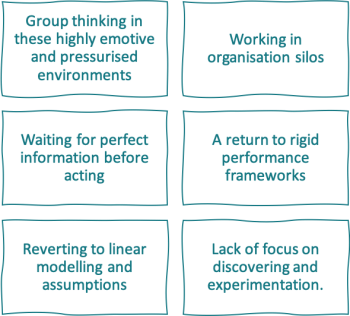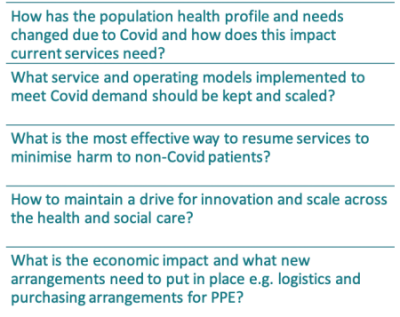What health and social care systems need to consider in planning to operate in the “new normal”
Covid-19 has once again highlighted why the NHS is so important to society. There have been many heroic stories of frontline staff and key workers. Caring for those in most need and continuing to work, when against the odds, resource shortages and the politics.
Having built the resolve and resilience to deal with the current crisis, what next?
We suggest a few points to consider.
Pivoting to the “new normal”
In tackling the pandemic, there have been numerous examples of innovation from telehealth, virtual workplaces to digital solutions. This has been driven by an unprecedented level of cross-organisation collaboration. Decisions that in normal times could take years of deliberation have passed in a matter of hours.
However, the pandemic has also magnified existing issues, from logistics, the lack of resources, personal protective equipment, doctors and nurses, to transparency in decision-making and the challenges faced by the social and care home sector responding to the crisis.
The NHS focus now shifts to the next stage of the recovery plan. Key planning themes are meeting the future Covid demand, working through the backlog of routine operations and determining innovations that become part of normal services.
In planning for the future, what is for certain is that we are in uncharted territory. NHS leadership will need to adopt new thinking and ways of working.
Living with uncertainty and unpredictability
Perhaps the biggest seismic event in a generation, Covid-19 has disrupted our economies, lifestyle and society in a way that has surprised many.
Lockdown policies have led to the unintended consequences and adverse impact on public health and wellbeing. There is evidence of growing mental health issues, need for safeguarding and domestic violence. Although indiscriminate in nature, it has disproportionally impacted certain parts of society more than others, further exacerbating inequalities.
We have seen disruption in normal services with cancellation of routine operations, and a significant drop in A&E activity and cancer referrals. There is a concern that the health service is storing up problems for after the first wave of the virus has passed. It is difficult to know how big the problem is as we are working with imperfect data.
There is also very little known about the virus itself. Why does it affect some people more than others, why more men are infected than women, what is the long term impact on the immune system, and can people be infected again? This is not an exhaustive list. With the prospect of a vaccine months away, there will continue to be a reliance on social distancing and public compliance.
What is clear, is that more agile and responsive planning and execution approaches are needed. Transformation built on imagination and empathy will be crucial in seizing and creating new opportunities from the current disruption across health and social care.
Recognising shifts in needs, behaviours and attitudes
One of the most profound impacts has been the changing behaviour of the population and patients. Pandemics, wars, and other social crises often create new attitudes, needs, and behaviours, which need to be managed.
We are seeing changes in attitudes from less tolerance of individualistic behaviour to a greater tendency to recognise the contributions of others. People are adopting to the new norms, for example, adhering to social distancing, new ways of interacting with health services, and increased adoption of digital solutions.
As we have seen from previous crises, there will be lasting shifts in social attitudes from COVID-19. There is a greater trust and admiration for the health service and key workers, and greater citizen participation. However, there are also some profound questions being raised on addressing social inequality and prioritising treatments.
Some of these trends will stick but there will also be ‘new needs’ as a result of the prolonged social isolation, economic impact, lifestyle changes and changing working patterns.
Moving forward, health and social care strategies, plans and assumptions developed before the pandemic will need to be re-assessed in light of these changes.
Take a ‘system’ approach
This crisis has illustrated the NHS at its best, where people work together towards a common purpose looking beyond the politics and organisational barriers. Ingenuity and innovation have flourished through clear team focus on providing the best care possible for patients – change through greater empathy and humanising services.
From our conversations with the leadership teams across the NHS, the view is that this is a golden opportunity to reimagine, disrupt and accelerate the transformation of health and social care. However, current strategies, plans, and rationale will need to be redrawn across integrated care systems (ICSs) and integrated care partnerships (ICPs), and challenged.
Previous solutions may not apply to the “new normal”. This will require a real change in our mental models, belief systems and strong leadership.
Avoiding the common traps
Tackling the challenges, will require the right balance between addressing the now and building for the future. It will need to be a journey of discovery with constant unlearning, relearning and adaptation. There are a few pitfalls to avoid (Figure 1).

Fig 1: Avoiding common management traps in times of crisis
Questions to inform planning
More now than ever, it is important for the health service to take this opportunity to start thinking differently. Here are a few questions we suggest management explore as part of the planning process.

Fig 2: Planning questions for management
Moving forward
Each health and social care system will have its own unique challenges. However, there will be elements for sharing which will need to be evaluated and disseminated. Tough decisions and questions on the reallocation of resources, budgets and workforce will be needed. To enable the pivot of operating models into the “new normal’, new capabilities will be required. It will not be easy and it will require both strong leadership and realignment of the regulatory environment.
Things that were unimaginable only six weeks ago are now mainstream such as basic income and the levels of debt and deficits that governments are taking on. This economic rethinking is being matched by a new way of thinking about our priorities as a society, such as our health and social care systems. Covid-19 has risen from the butterfly defect of globalisation. The last few weeks have demonstrated the power of goodwill and solidarity. Let’s not waste a crisis.




